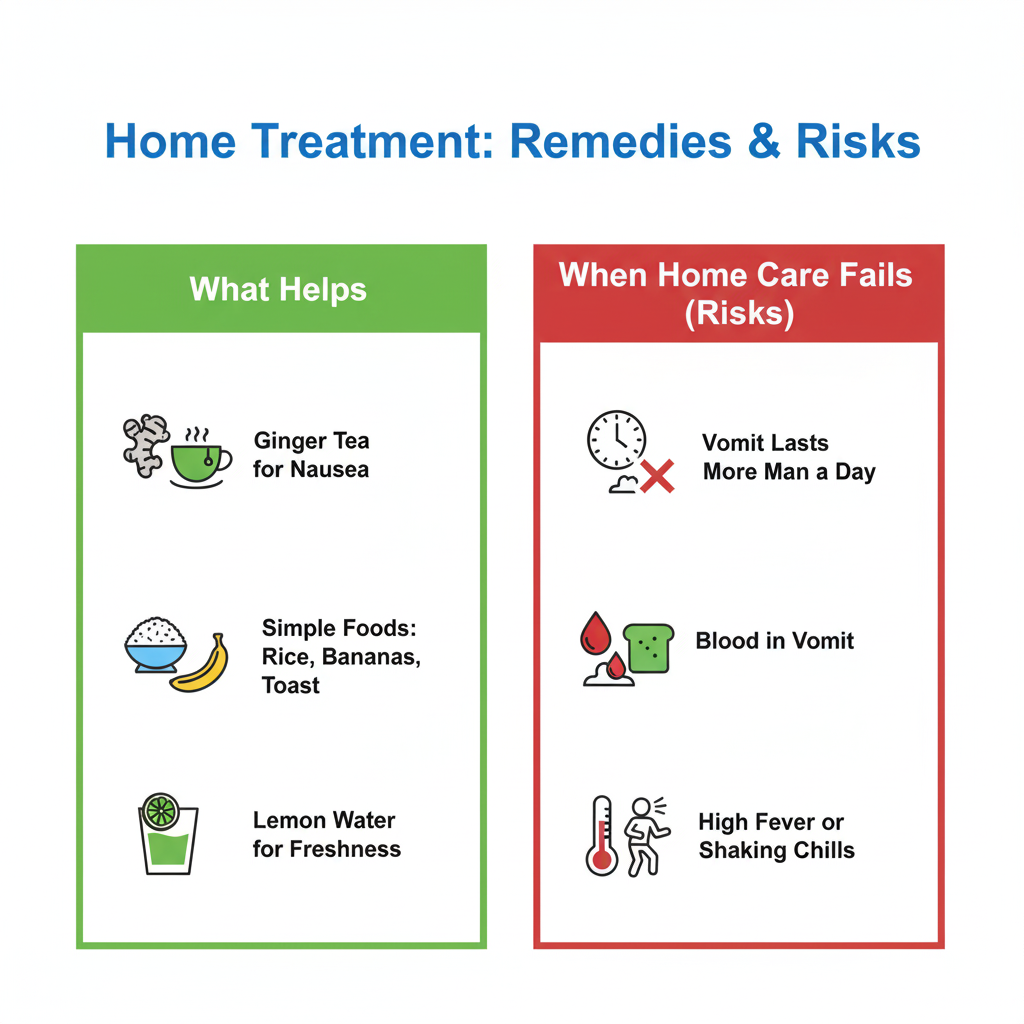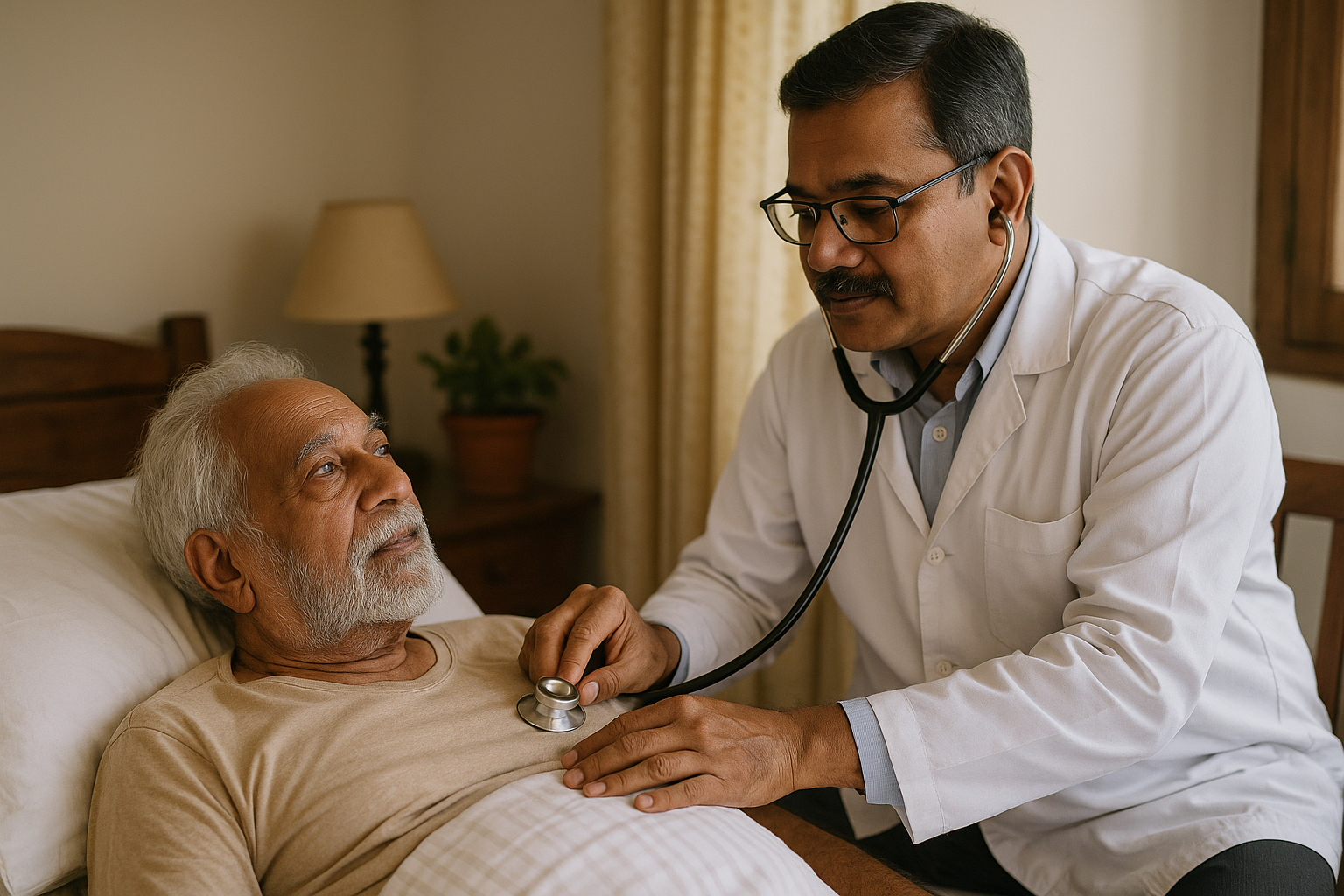Vomiting with weakness can turn a normal day upside down. When this happens, you want to make the right call. Do you take care of things at home, or is it smarter to get to a clinic? This guide uses simple words, short sentences, and advice designed for everyone. It's shaped by Dr. Morepen Home's trusted in-home healthcare knowledge, made just for families seeking safe, fast help.
Fast Relief: What to Do First for Vomiting and Weakness
Immediate Steps at Home for Rapid Relief
If you feel sick and weak, the first thing is rest. Sit or lie down. Grab a clean towel or bowl in case you feel like being sick again. Take tiny sips of water. Wait a little before you drink more. Solid food can wait for at least an hour or two. If you have an oral rehydration solution, use it. If not, make your own: one liter water, six teaspoons sugar, and half a teaspoon salt. Stir well.

Tips for comfort:
- Keep a bucket nearby
- Try to sleep with your head higher
- If strong smells upset you, open a window
When Vomiting Signals a Medical Emergency
Some signs mean you should not wait. If the sick person can't keep water down for over eight hours, if they see blood, if there is chest pain, or the weakness is so severe they cannot stand, seek help right away. Call a doctor or head to the nearest clinic.
Recognizing Symptoms that Need Urgent Clinic Care
Look out for these signs:
- Vomiting many times in one day
- No pee in eight hours
- Acting confused or very drowsy
- Fast heartbeat, dry lips, or sunken eyes
Call for help if you spot any of these.

How to Stay Hydrated and Nourished
Sip water, coconut water, or clear juice. Take breaks between sips. If this stays down, move to light foods like toast or banana after a few hours. Don’t rush. Let your hunger come back on its own.
Understanding Causes Behind Vomiting and Weakness
Common Triggers: Infections, Food, Motion, and More
Lots of things can cause vomiting and weakness:
- Bad food or water
- Stomach infections
- Motion sickness from a car or bus
- Some medicines
Sometimes, worry or stress can upset the stomach too.

Underlying Medical and Lifestyle Factors
Other health problems—like diabetes, thyroid issues, or taking new drugs—might play a part. Skipped meals, too many oily foods, or even staying up too late can sometimes lead to these feelings.
Psychogenic, Medication, and Chronic Causes
Feeling very worried, nervous, or sad can upset the stomach. Some people feel weak and sick from stress. Long use of certain medicines—like antibiotics—may also cause vomiting. Ongoing sickness from liver or kidney issues will need doctor care.
Differences in Children, Adults, and Older People
Kids get sick quicker. They need care fast because they get dehydrated easily. Older people may not bounce back quickly. For adults, mild problems often settle at home—but keep a close eye, always.
Home Treatment for Vomiting and Weakness: Pros, Cons, & Precautions
Popular Home Remedies Backed by Experts
Try these if symptoms are not severe:
- Drink ginger tea for nausea
- Eat simple foods—rice, bananas, toast
- Lemon water for a fresh feeling
Ginger and bananas can help some. Stick to foods that do not upset your stomach.

Herbal, Ayurvedic, and Natural Soothers: What Helps, What Doesn’t
Many families trust cumin or ajwain (carom seeds) water. Buttermilk is also gentle. These can be safe in small amounts. But don't use new remedies if you have never tried them. Skip anything that has a very strong taste or smell when you are sick.
Risks and When Home Care Fails
Home care is fine for a mild problem. But, watch for warning signs:
- Vomit lasts more than a day
- Blood in vomit
- High fever or shaking chills
These mean get medical help. Waiting too long can be risky.
How to Prevent Dehydration and Electrolyte Imbalance
Drink often but in small sips. Use ORS or coconut water. Avoid soft drinks and caffeine—they may make things worse.
Self-Monitoring: Tracking Symptom Changes at Home
Check how often you pee, if skin feels dry, or if you feel dizzy when you stand. If things get worse, move to clinic care.
Clinic-Based Care: What to Expect When You Seek Help
Diagnosis and Tests: From Physical Exam to Bloodwork
Doctors will check pulse, look for pain, ask about food and travel. They may suggest blood or urine tests. Sometimes, they will want an ultrasound or scan if pain is bad.
Medical Treatments for Vomiting and Weakness
Doctors can give medicine to stop vomiting. If you are dehydrated, they might give fluids with a drip. If infection is found, antibiotics can help.Learn more about the role of nurses in management.

How Clinics Manage Severe or Persistent Cases
Some need to stay the night in the clinic if things are serious. There will be tests, fluids, and close watching until you are better.
Recovery Expectations: Timeline, Safety, and Follow-ups
Most get better in two days. If doctors find a problem with your liver, kidneys, or blood, they will tell you about the next steps. Always finish medicines as told.
Conclusion
Vomiting with weakness is hard, but many times it gets better with simple home care. Start with rest, fluids, and watch for warning signs. If things do not improve or you notice danger signals, clinic care is safe and smart. Dr. Morepen Home gives families options — expert home support and guidance for knowing when to get clinic help. Act early, trust your judgment, and reach out if in doubt. Health always comes first.
Frequently Asked Questions (FAQ) about Vomiting and Weakness
1 How long can I safely treat vomiting at home?
If vomiting is mild, you can try home care for 24–48 hours. If symptoms last longer, or if you can't keep even small amounts of water down, it's time to see a doctor.
2 What home remedies should I avoid?
Avoid strong-smelling foods, oily or spicy meals, and citrus juices. Do not try large amounts of unfamiliar herbal remedies, as some could upset your stomach more.
3 When do I need to be concerned about dehydration?
Signs include dry mouth, little or no urine, very dark urine, confusion, racing heart, or sunken eyes. These mean you need fluids right away or medical help if you cannot drink.
4 Is it normal to feel weak after vomiting?
Yes, weakness is common. Rest, drink fluids slowly, eat bland foods, and let your body recover. If weakness is severe or continues after vomiting stops, get checked by a doctor.
5 Can vomiting and weakness mean something serious?
Yes, it can be a sign of severe infection, blockages, or other medical problems. Blood in vomit, high fever, constant pain, or not being able to keep any fluids down means you should go to a clinic or hospital quickly.
.png)


.png)
.png)
.png)
.png)
.png)
.png)
.png)
.png)
.png)
.png)
.png)
.png)
.png)
.png)
.png)
.png)
.png)
.png)
.png)
.png)
.png)


.png)
.png)
.png)
.png)
.png)
.png)
.png)

.png)
.png)
.png)

.png)
.png)
.png)
.png)
.png)
.png)

.png)
.png)

.png)
.png)
.png)

.png)

.png)


.png)







